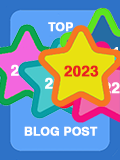Team learning: A revolution in personnel development
- “Unfortunately, we are completely overloaded – there is no time for professional development here!”
- “The daily work routine is too condensed! How are we supposed to create learning time in everyday life?”
- “Unfortunately, the training offered by our company is too unspecific – we have more specific training needs.”
Do any of these statements sound familiar?
Then I can only recommend that you take a close look at the concept of “team learning” – in my view, this will become an elementary component of corporate learning in the future!
A brief classification: What is team learning?
Team learning is about teams acquiring content together: skills, methods and expertise – and not by sitting together in a classic two-day seminar, but in small-scale, innovative formats such as Learning Circles, Learning Walks, etc. and above all on their own initiative.
This is “revolutionary” for the following reasons:
- The responsibility for learning topics, their preparation and suitable learning formats – and thus the responsibility for further development – is given to where the learning actually takes place: to the team.
- This also changes the role of HR development: away from the role of generic training catalogue creator to a real sparring partner for teams.
- Teams that curate learning content themselves can tailor it much more precisely to the learning needs of the team – and such curated formats are often compiled from existing and/or free content: this means that team learning formats are ultimately also more cost-effective than attending “classic” training courses.
- Through the joint learning approach, team learning formats are a solution to the “we don’t have time to learn” problem – joint learning time is integrated into everyday work through the small-scale formats – real “learning in the flow of work”.
- Ultimately, team learning in practice also pays off in terms of team performance – not only through professional development, but also through the feeling of togetherness that is created through joint learning.
I can only advise any company looking for a lean and innovative approach to human resource development to take a closer look at the concept of team learning. Of course, the idea is not to learn only in such formats from now on, but to “approach” the topic in several steps.
Four different levels of team learning
A good and low-threshold introduction to the concept of team learning can be provided by small joint learning inspiration formats. Here it is not yet about learning content, but simply about bringing random impulses into the team and contributing to a living learning culture. My two format recommendations for team learning level 1 are therefore:
- Share your own current learning inspiration in your email signature. For example, you might write “I am currently inspired to learn about article xy because…”. This is a very low-threshold way to actively promote the learning culture in the team – and incidentally, you also receive many new learning impulses yourself through the shared learning inspirations of your colleagues.
- Integrate a learn-in into the team jour fixe: The idea here is to use the first two minutes of the meeting to share one’s own current learning inspiration instead of a classic check-in – this can either be done by another team member every week or all team members share their own learning inspirations weekly (then all in the chat, for example).
Team learning level 2 is also about the learning culture and “making everyday learning visible” – and for this I recommend, for example, the small tool “learning glass”: You can either set this up as a physical glass in the office or as a digital version on a digital whiteboard tool. The aim is to fill this learning glass with all the small everyday learnings that otherwise “slip through”. For example, one could be: “I have found the following Excel hack…”.
With the glass getting fuller and fuller, you can visualise wonderfully what the team is already learning in everyday life. And if you want to really celebrate these everyday learnings, have a regular Unglassing party.
If you have already approached the topic of team learning a little via such inspirational formats, you can also approach more structured forms in level 3 – I would recommend the following formats as a start here:
- A team learning dashboard for the joint planning of learning projects for the coming semester. In the end, this is nothing more than an adapted Kanban board with 1) a learning backlog in which all future learning projects end up, 2) a column “current learning project” and 3) the “classic Kanban columns” “to learn”, “learning” and “learnt” in which the respective learning nuggets of the current learning project are sorted and then moved on. The tool is a nice structuring and prioritisation aid for joint learning.
- A specific team learning project (such a project could be: “We want to learn the principles of Getting Things Done”) can then be approached in a structured learning circle format. For this, the individual learning nuggets are distributed over a fixed period of time (e.g. six weeks) and the subject content is worked through in these in joint circle meetings and own reflection units.
Level 4 ultimately creates common learning routines – in other words, it is about creating “space” in the calendar for learning. In my experience, the “Learnathon” is a very good format for this. The core idea here is to create a common hour of learning time in the week through a series of appointments. During this hour, people sit down together either physically in a meeting room or digitally and everyone works on their own learning topics in a concentrated way. This simulates a little bit of library learning from your studies, is “lonely together” and such a joint appointment also always creates a little “social pressure” – similar to the gym appointment, you don’t tend to let it “fall behind”.
Elementary parameters for improved team learning
So, before you get started full of enthusiasm, I would like to give you two elementary framework conditions for successful team learning:
- The central prerequisite is the willingness of each individual to self-reflect. The willingness to learn of a team depends strongly on the willingness to learn of the individual. This means that each team member is also required to continuously reflect on himself or herself – both with regard to his or her own learning fields as well as with regard to his or her own learning routines and the personally optimal learning setting.
- But even without trust in the team, the most sophisticated team learning roadmap is doomed to fail! Learning new content often challenges one’s own routines and behavioural patterns, and this also involves “making oneself vulnerable”. Sharing these in agreed formats and thus making them visible does not work if each individual does not feel the sense of a protected space. But how do you find your way into trust? Here I can recommend the wonderful little tool “Instruction manual for myself” as an introductory exercise. The core: each team member reflects on what makes him/her tick in terms of communication, working style, strengths, focus topics etc. and shares this instruction manual with the team. Try it out, the aha effect and the resulting mutual understanding is remarkable.
In conclusion, it only remains for me to wish you much joy in testing out the “Road to Team Learning”.
Notes:
Dr. Cornelia Hattula runs the great podcast “Was lernst Du?“, which she has also already presented in a conversation on the t2informatik Blog. Definitely worth listening to! And if you want to talk to her about learning formats and learning in a team, it’s very easy via her LinkedIn profile.
You can find information on the learning tools and formats mentioned in various German LinkedIn posts:
- Learnathon
- Lern-Dashboard
- Learn-In
- Lerninspiration in der Email-Signatur
- Learning Circle
- Lernglas
- Gebrauchsanweisung für mich selbst
This is a best of blog post 2023.
If you like the article or want to discuss it, feel free to share it with your network.

Dr. Cornelia Hattula
Dr. Cornelia Hattula is a learning & development expert with almost a decade of experience in various positions in the management of education companies. She thinks (further) education differently and modernly – especially through the topics of “team learning” and “agile learning” and is now considered a high-profile thought leader in the field of “new learning”. She regularly shares her thoughts on this topic in LinkedIn posts, as a speaker and impulse generator at conferences and as a host on the podcast “Was lernst Du?”.
